Poachers are the prey in a park in the Republic of Congo
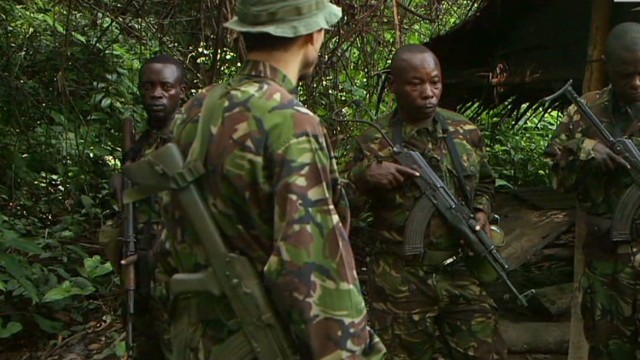
Chasing elephant poachers in Congo
STORY HIGHLIGHTS
The river's dark waters
are stunningly framed by shades of green and cascading vines in this
remote corner of the Republic of Congo.
As Eckel's eco-guard unit
turns a corner, he gives the order to cut the engines. We're
approaching the first suspected site. The boats coast silently against
the hum of the forest.
The team quietly assaults, but the camp is deserted.
A member of the team
checks the ashes. "It's still warm, they must have left early morning,
we missed them by a couple hours," he says.
For the next grueling, hot eight hours, the same scenario repeats itself.
Then, suddenly around a
bend, the unit spots rising smoke. They rush ashore, fan out and within
seconds the first gunshot rings out. The men sprint through the dense
and disorienting terrain, forcing their way though the undergrowth and
knee-deep water as even more bursts of gunfire echo through the forest.
Pumped on adrenaline, eco-guard Brice Moupele animatedly re-enacts what happened when he saw the poachers.
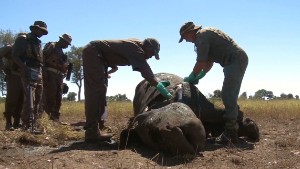 Rhino poaching 'relentless' in S. Africa
Rhino poaching 'relentless' in S. Africa
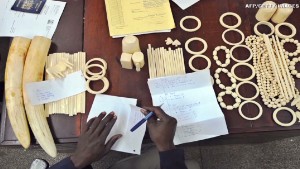 Ivory demand fuels elephant poaching
Ivory demand fuels elephant poaching
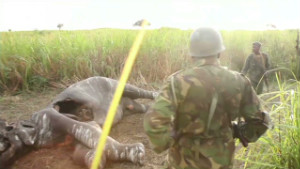 Elephants slaughtered from the sky
Elephants slaughtered from the sky
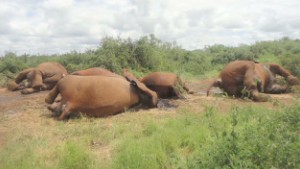 Rangers dying with elephants in Kenya
Rangers dying with elephants in Kenya
"I yelled 'Stop, stop!' and shot in the air," he says.
"The man tried to shoot
at me. I tackled him and grabbed his gun, but he was able to escape."
Moupele happily displays the captured weapon.
The team finds the
poachers' canoe, weighed down with fresh elephant meat. An eco-guard
lifts up a portion of the elephant's trunk, still dripping blood. He
lifts up heavy chunks of elephant flesh, searching for weapons and tusk
on the bottom of the wooden canoe.
"This is what they use to cut off the tusks" Eckel says, holding up a bloodied ax.
It's a sickening
reminder of a trade that has decimated the park's elephant population.
The non-profit group African Parks -- which runs Odzala -- estimates
that Central Africa has lost 62% of its forest elephant population in
the last decade. In the week we spent at the park, we only saw one
alive.
"The ivory we get, it's
less than 1%" Eckel estimates. "In this area, it makes a lot of money.
It's very difficult to say, maybe one or more elephant is killed a day."
Eckel describes the
fight to protect what's left as guerrilla warfare carried out by just 76
eco-guards patrolling an area that is 13,500 km2 (8,390 square miles)
-- about the size of Connecticut. Hardly enough, but around 40% of the
team members are former poachers themselves.
"They are really
motivated to stop the poaching and they know how the poachers work, so
it's easy for them to think like them," Eckel explains.
It's part of a program
developed by Eckel in the past year in which poachers are given amnesty
if they hand over their weapons and confess. But it's still a tough sell
in an area where villages live off poaching and there are no other
alternatives.
The unit's successes
haven't made them any friends. Members often find themselves pursuing
neighbors, friends and even family members. They have all been
threatened.
Frank Bolangonga tells us three men assaulted his wife down a dark side street in his village.
"She went to buy petrol
at the market," he says. "When she was on her way back home they
attacked her, tried to rape her, but she was strong. She pulled back and
her dress ripped and she ran away."
The threats intensify
after arrests and raids, and did so even more after the team brought in
Ghislain Ngondjo, better known as "Pepito."
Vianney Evoura, who used
to poach for Pepito back in 2004, testified against him in court. They
live in the same village and Pepito's relatives have vowed revenge.
"His mother promised to
poison me," Evoura says. "I don't go out after dark unless I am with
five or six other people, I don't eat out. I am always on alert."
African Parks headquarters is just a 10-minute drive from Pepito's village, which has forced Eckel to send his own family away.
"There was threats of
attack on the camp where we live, my family was with me at this time. I
don't want to take the risk for them because of my job," he tells us.
But the toughest
challenge for Eckel and his team is government corruption. He doesn't
trust for a second that the government will follow any leads after the
bust on the poachers' camp.
The team finds four
guns, one of which Eckel says is military issue. Of all of the weapons
the unit has in its stockpile -- a combination of those handed over in
the amnesty program and those seized in raids -- the majority come from
military stock.
"The military sells firearms to the poachers," Eckel claims. "Sometime we catch military with their firearms inside the park."
In an area where the
lines between poachers and protectors tend to blur because of village
and family ties, at times the team can't even trust itself.
"To find this in the
Congo you must have contact with a ranger," Eckel says, showing a
compass found at the poachers' camp. "It's a silver one and it's not an
old one."
Also found during the raid was a cellphone.
The team torches the
camp to send a message and sets off down the river with the poachers'
canoe in tow as bright orange flames engulf the ramshackle huts.
But it's far from over.
The next morning, Eckel
is busy drawing a map in the sand, strategizing the best way to get into
position. One of the numbers on the phone they found is that of a
notorious bushmeat trader.
"We had an initial phone
contact and we organized a meeting," Eckel explains. "We play like we
are the poacher and he thinks we are the poacher."
It's an ambush.
Barreling down the road, the team spots the bushmeat trader on his
motorcycle. Shouting with guns pointed, they force him to pull over.
"How do you justify that
this phone we called you from was found with a poacher?" Eckel asks the
trader. "You were saying that you wanted to collect material, ivory."
"I don't know who called me," the trader claims. "Everyone in the village has my number."
The cell phone rings,
answered by an eco-guard pretending to be the suspected poacher. The
person on the other end of the line issues a breathless warning.
"Remove all the weapons from the camp by the river, we've spotted the eco-guards at the small port."
Meanwhile, the trader breaks, giving up the name and location of the cell phone's owner.
"They are just there, they live there. He's a young guy."
The team detains not
one, but two brothers and take them back to one of the unit's
checkpoints. One confesses to owning one of the rifles found at the
camp, but both deny they shot at the eco-guards and refuse to give up
the names of the other members of the gang.
They are handcuffed and driven off to jail.
When we return to
Brazzaville, we interview Henri Djombo, minister of Forest Economy and
Sustainable Development, and ask about the rampant corruption claims.
He denied direct military complicity, but conceded the government needs to clean up its ranks.
"Yes, it is true that there are accomplices to this illegal trading of wildlife, that is not easy," he told us.
He insists that the government is committed to fighting corruption and ending the culture of poaching with impunity.
A few days after the two
brothers were detained, their families gave up the names of the rest of
the gang members, in hopes of getting the brothers out of jail.
Based on that intel, the
unit carried out another raid. One of the eco-guards was severely
wounded, run over by a motorcycle as they attempted to detain the
suspected poacher.
As the team was transporting the wounded guard to hospital, gang members torched the eco-guard camp at the checkpoint.
Out here, the war on ivory trading is violent and personal.
